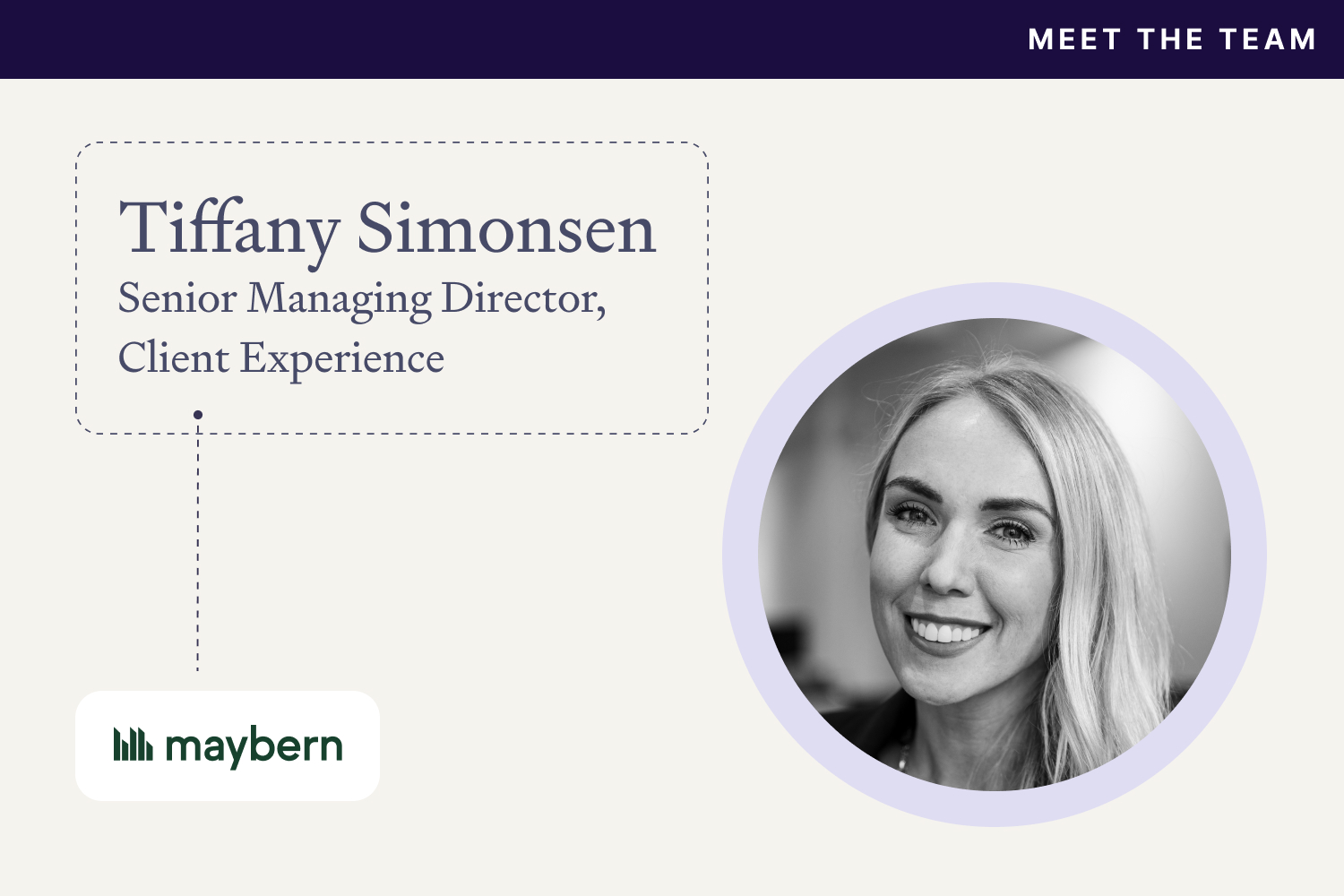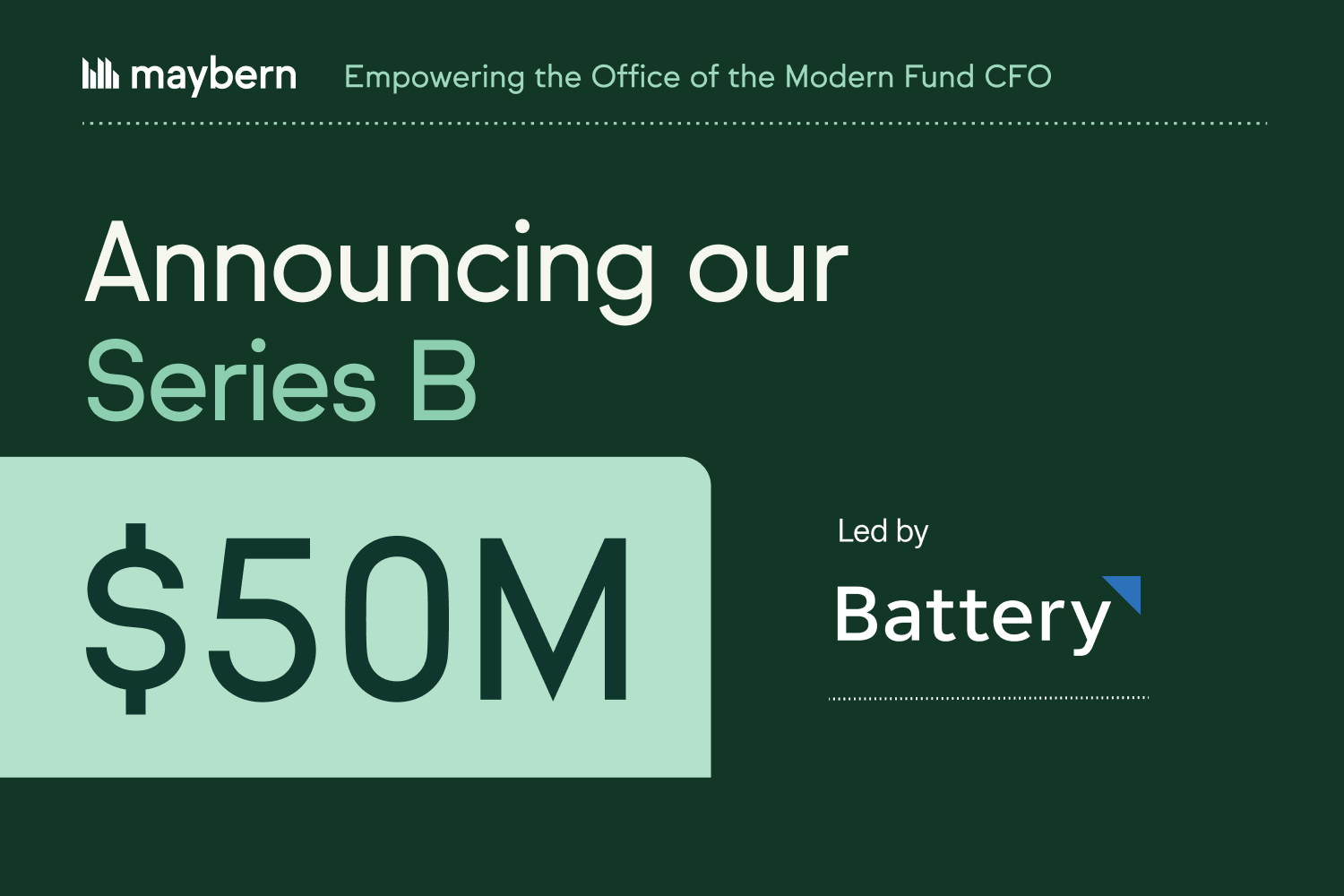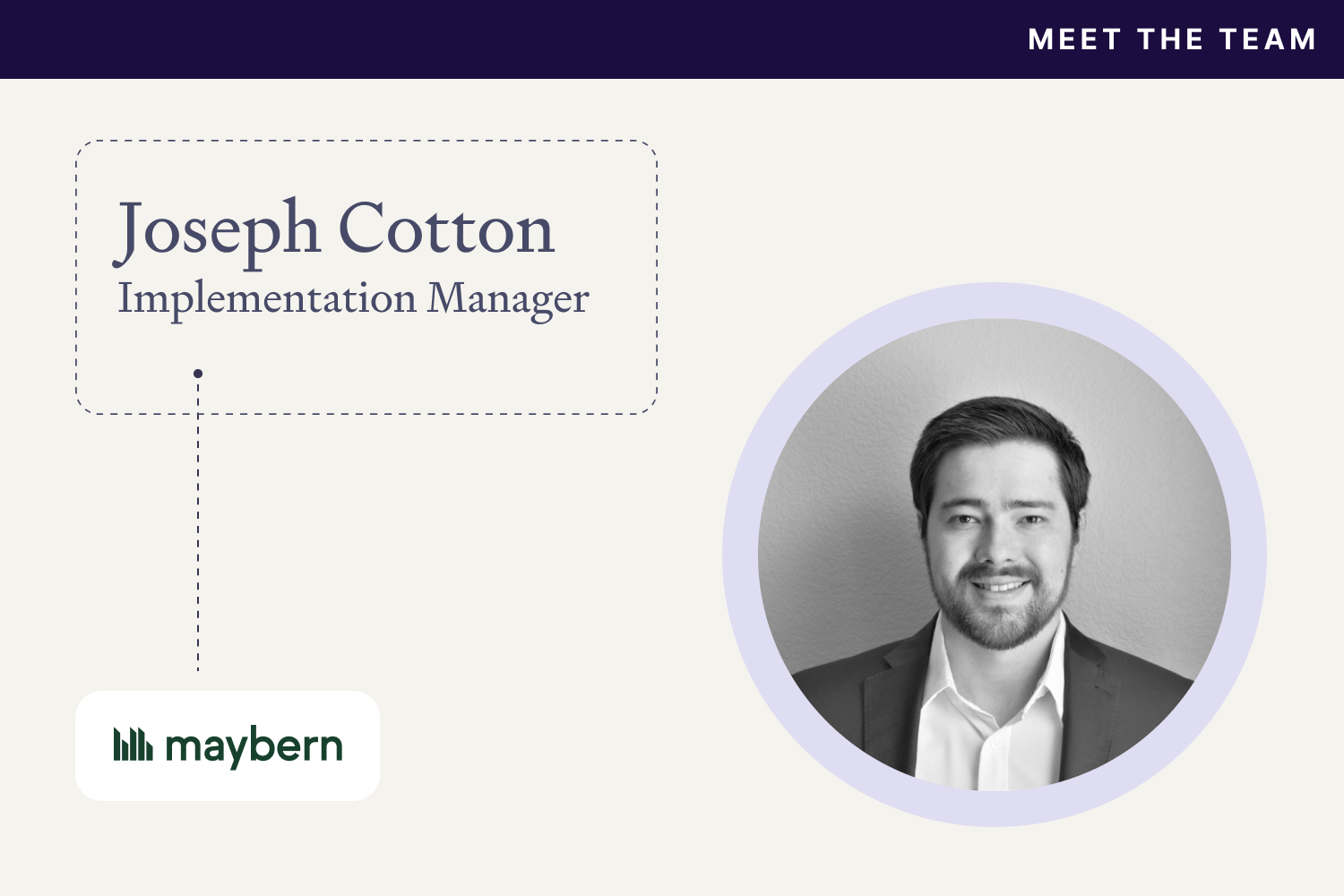
Meet the Team: A Conversation with Tiffany Simonsen, Senior Managing Director, Client Experience at Maybern
Welcome to the latest installment of our “Meet the Team” series, where we introduce the talent and expertise driving Maybern’s mission to transform the Office of the CFO from operational management to strategic leadership.
Tiffany Simonsen is Senior Managing Director of Client Experience at Maybern, where she leads high-impact, insight-driven engagements from the very first meeting, through full-scale implementation and beyond. Working directly with clients, Tiffany ensures that each firm benefits not only from her team’s decades of fund accounting and operational experience, but also from Maybern’s expansive view of industry best practices.
In parallel, she plays a pivotal role across the private markets ecosystem, curating strategic introductions, advising on fund complexities, data strategy, AI adoption, and translating evolving requirements from LPs, auditors, and regulators into Maybern’s product roadmaps. Her work positions Maybern as more than just a software provider; it makes the firm a trusted extension of each client’s operating team.
Before joining Maybern, Tiffany spent 13 years at Goldman Sachs, where she co- led their Fund Accounting team focused on Real Estate and Employee Vehicles. Throughout her career, Tiffany has also focused on credit funds, open ended funds, performance in both public and private markets, and working closely with engineering teams to reduce risk and gain efficiencies for fund finance teams.
What common themes do you hear when speaking with fund CFOs about their operations?
Tiffany: The same challenges come up again and again: lack of direct access to their data, uncertainty about whether their administrators’ calculations are fully accurate, and frustration with how long it takes to get answers for LPs. Even when firms have strong admin partners, the operating model often keeps the CFO at a distance. They’re constantly reconciling, checking numbers, and waiting for data, all while trying to meet demands from investors and internal stakeholders.
That lack of control slows decision-making, erodes LP confidence, and keeps CFOs buried in spreadsheets rather than focused on strategy. What excites me about Maybern is that we’re solving that control problem directly. Our platform gives CFOs their footing back. They can validate numbers instantly, respond to LPs in real time, and focus on shaping outcomes rather than chasing inputs.
What’s one piece of accounting logic or LPA clause that still gives people trouble, even experienced professionals?
Tiffany: Equalizations remain a challenging mechanic, especially as higher credit facility rates and longer fundraising cycles make them more common. Because they only arise during fundraising, teams often miss key events or fail to capture the correct impact of distributions before admitting new investors.
Meanwhile, Investor Relations and fundraising teams need projections showing what an incoming LP’s capital, equalization interest, fee catch-ups, and offsets would look like as of a certain date. That task alone can tie up a team member for an entire day. Our closing flow automates that in seconds, reducing errors and freeing up capacity. It also signals to LPs that the firm operates with precision.
What’s one emerging trend in fund finance operations that you think firms ignore at their own risk?
Tiffany: Too many firms underestimate the growing complexity of side letters and bespoke investor terms. A decade ago, LPs typically accepted standard terms with small fee variations. Now, nearly every institutional LP negotiates unique economics, co-investments, or vehicles.
The result is a web of subtly different rules around fees, allocations, or carry terms that all need to be honored exactly. Ignoring this creates risk across the board. Allocations go wrong, Excel waterfall files explode with tabs, LPs ask tougher questions, and operational errors start compounding. It’s very difficult to capture all of these nuances in Excel in a precise way and have these calculations be transparent or to rely on tribal knowledge; they need systems that make these obligations transparent, auditable, and operationally scalable. If firms don’t invest in systems that make these obligations transparent and auditable, they’ll face both operational and reputational risk.
What’s a reporting request from GPs or LPs that would’ve been nearly impossible ten years ago, but is now expected?
Tiffany: Ten years ago, LPs might have waited weeks for fund-level NAVs or performance reports. Now, they expect full transparency down at a very granular level of detail, down to investor-level IRRs, fee offsets, and even NAV estimates including individual side-letter terms, delivered on demand. Increasingly, they also want it in standardized formats like ILPA Templates or custom reporting packages that integrate into their own systems.
The bar for responsiveness is higher than ever. What was once a “nice to have” is now a baseline expectation. CFOs who can’t meet that level of service are at a disadvantage when fundraising.
Which part of Maybern’s product do you wish you’d had earlier in your career, and why?
Tiffany: I wish I had Maybern earlier in my career. It solves so many of the pain points that were always on my wishlist. Two that stand out are credit facilities and waterfalls.
With credit facilities, we tracked everything in Excel, catching errors in interest expense from the bank, and constantly updating borrowing bases for subscription lines. Allocations to deals were often skipped because the process was too painful, Whereas in software, it’s seamless.
Waterfalls were even harder. They’re highly complex, heavily scrutinized internally and externally, and nearly impossible to review in Excel without re-performing the calculations just to confirm carry allocations. With Maybern, it takes minutes, and you get full transparency through every tier. That shift is huge for both accuracy and speed.
Where do you think the fund finance profession will be in five years and what needs to happen to get there?
Tiffany: We’re at an inflection point. Historically, fund finance has been about “closing the books,” ensuring debits and credits tied out, financial statements were produced, audits were clean, and notices went out on time. In five years, I think the focus will shift to forward-looking insights and scenario planning.
To get there, CFOs need to move past spreadsheets and legacy admin models that rely on constant and endless reconciliation. They need governed, structured data that flows from workflows into reports, investor communications, and strategic planning tools.
AI will play a big role in this shift. Once the foundation is strong, AI can surface insights in minutes that used to take hours. However AI is only as good as the data beneath it. Without trustworthy data, there’s no leverage. The most effective CFOs will combine strong systems with trustworthy data, and leverage AI to deliver fast, confident answers to LPs, deal teams, and boards. I’m excited to see how Maybern continues to lead in this space.
What's most rewarding about helping funds transform their operations?
Tiffany: For me, the real reward is seeing CFOs and their teams step into the roles they’ve always wanted, and that LPs expect. Too often, they’re stuck checking Excel formulas, which leaves no time for actual decision-making.
When Maybern lifts that burden, everything shifts. CFOs can go from asking, “Is this formula referencing the right cell?” to “How should we structure this distribution to maximize IRR?” or “What does this scenario mean for our next fundraise?” That’s a fundamental shift from reactive to strategic.
The best feedback I’ve received is when a client says their team is not just faster, but have a deeper and strategic understanding of the business. They walk into LP meetings with confidence in their data and can run scenarios live, and spend the time they have gained back thinking critically about the future of the fund. That’s the kind of transformation that makes this work so meaningful.
Recommended Content



